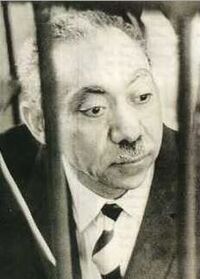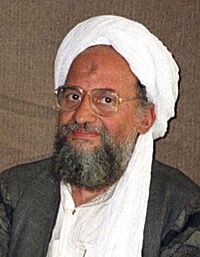Qutbism facts for kids
Qutbism (Arabic: ٱلْقُطْبِيَّةِ, romanized: al-Quṭbīyah) is an exonym that refers to the beliefs and ideology of Sayyid Qutb, a leading Islamist revolutionary of the Muslim Brotherhood who was executed by the Egyptian government in 1966. Influenced by the doctrines of earlier Islamists like Hasan al-Banna and Maududi, Qutbism advocates armed Jihad to establish Islamic government, in addition to promoting offensive Jihad.
Sayyid Qutb's treatises deeply influenced numerous Jihadist movements across the world. Qutbism has gained prominence due to its influence on notable Jihadist figures of contemporary era such as Abdullah Azzam, Osama bin Laden, Ayman al-Zawahiri, and Saif al-Adel. Its ideas have also been adopted by the Salafi-jihadist Islamic State organization. It inspired Ruhollah Khomeini to create a variety of Qutbism, Khomeinism.
Qutbist literature has been a major source of influence on numerous Jihadist organisations that have emerged since the 1970s. These include the Egyptian Islamic Jihad, Jama'ah al-Islamiyya, al-Takfir wal Hijra, Armed Islamic Group of Algeria (GIA), LIFG, Al-Qaeda, Al-Nusra Front, Islamic State, and others that have sought to implement their strategy of waging armed Jihad.
Contents
Terminology
While adherents of Qutbism are referred to as Qutbists or Qutbiyyun (singular: Qutbi), they rarely refer to themselves with these names (i.e. the word is not an endonym); the name was first and still is used by the sect's opponents (i.e. it is an exonym).
Tenets
The main tenet of the Qutbist ideology is that modern Muslims abandoned true Islam centuries ago, having instead reverted to jahiliyyah. Adherents believe that Islam must be re-established by Qutb's followers.
Qutb outlined his religious and political ideas in his book Ma'alim fi-l-Tariq ("Milestones"). Important principles of Qutbism include:
- Adherence to Sharia as sacred law accessible to humans, without which Islam cannot exist
- Adherence to Sharia as a complete way of life that will bring not only justice, but peace, personal serenity, scientific discovery, complete freedom from servitude, and other benefits;
- Avoidance of Western and non-Islamic "evil and corruption," including socialism, nationalism and consumerist capitalism.
- Vigilance against Western and Jewish conspiracies against Islam;
- A two-pronged attack of
- preaching to convert and,
- jihad to forcibly eliminate the "structures" of Jahiliyya;
- Offensive Jihad to eliminate Jahiliyya not only from the Islamic homeland but from the face of the Earth, seeing it as mutually exclusive with true Islam.
History
Spread of Qutb's ideas
Qutb's message was spread through his writing, his followers and especially through his brother, Muhammad Qutb. Muhammad was implicated in the assassination plots that led to Qutb's execution, but he was spared the death penalty. After his release from prison, Muhammad moved to Saudi Arabia along with fellow members of the Muslim Brotherhood. There, he became a professor of Islamic Studies and edited, published and promoted his brother Sayyid's work.
One of Qutb's key proponents was one of his students, Ayman Al-Zawahiri, who went on to become a member of the Egyptian Islamic Jihad and later a mentor of Osama bin Laden and a leading member of al-Qaeda. He had been first introduced to Sayyad Qutb by his uncle, Mafouz Azzam, who was a close friend to Qutb and taught his nephew that he was an honorable man. Zawahiri paid homage to Qutb in his work Knights under the Prophet's Banner.
Qutbism was propagated by Abdullah Azzam during the Afghan-Soviet War. As the Muslim jihad volunteers from around the world exchanged religious ideas, Qutbism merged with Salafism and Wahhabism, culminating in the formation of Salafi jihadism. Abdullah Azzam was a mentor of bin Laden as well.
Osama bin Laden reportedly regularly attended weekly public lectures by Muhammad Qutb at King Abdulaziz University, and to have read and been deeply influenced by Sayyid Qutb.
The Yemeni Al Qaeda leader Anwar al-Awlaki also cited Qutb's writings as formative to his ideology.
Many Islamic extremists consider him a father of the movement. Ayman al-Zawahiri, former leader of al-Qaeda, asserted that Qutb's execution lit "the jihadist fire", and reshaped the direction if the Islamist movement by convincing them that the takfir against Muslim governments made them important targets.
Backlash
Following Qutb's death, his ideas spread throughout Egypt and other parts of the Arab and Muslim world, prompting a backlash by more traditionalist and conservative Muslims, such as the book Du'ah, la Qudah ("Preachers, not Judges") (1969). The book, written by Muslim Brotherhood Supreme Guide Hassan al-Hudaybi, attacked the idea of Takfir of other Muslims, though it was ostensibly intended as a criticism of Mawdudi.
Views
Science and learning
On the importance of science and learning, Qutb was ambivalent.
He wrote that Muslims should learn science and develop their capabilities to fulfill their role as representatives of God. He encouraged Muslims to seek knowledge in abstract sciences and arts, whether from Muslim or non-Muslim teachers, so that Muslim communities will have their own experts.
However, Qutb believed that Muslims were not allowed to study some subjects, including:
the principles of economics and political affairs and the interpretation of historical processes... the origin of the universe, the origin of the life of man... philosophy, comparative religion... sociology (excluding statistics and observations)... Darwinist biology ([which] goes beyond the scope of its observations, without any rhyme or reason and only exists for the sake of expressing an opinion...).
He also believed that the era of scientific discovery in the West was over, and that further scientific discovery must be reached in accordance with Sharia law.
Sharia and governance
Qutbism advocates the belief that in a sharia-based society, wonders of justice, prosperity, peace and harmony—both individually and societally—are "not postponed for the next life [i.e. heaven] but are operative even in this world".
Qutb believed harmony and perfection brought by Sharia law is such that the use of offensive jihad to spread sharia-Islam throughout the non-Muslim world is not aggression but rather means of introducing "true freedom" to the masses. Because Sharia law is judged by God rather than man, in this view, enforcing Sharia frees people from servitude to each other.
In other works Qutb describes the ruler of the Islamic state, as a man (never a woman) who "derives his legitimacy from his being elected by the community and from his submission to God. He has no privileges over other Muslims, and is only obeyed as long as he himself adheres to the shari‘a".
The West
In Qutb's view, Western Imperialism is not only an economic or racial exploitation means of oppression, but rather an attempt to undermine the faith of Muslims. He believed that historians lied to confuse Muslims and weaken their faith by teaching, for example, that the Crusades an attempt by Christians to reconquer the formerly Christian-ruled holy land. He believed that the ultimate goal of these efforts was to destroy Muslim society.



